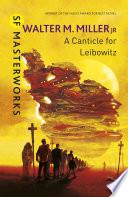Ch 20
A Canticle for Leibowitz (1959), Fiat Lux
Quotes from book
A Canticle for Leibowitz

A Canticle for Leibowitz is a post-apocalyptic science fiction novel by American writer Walter M. Miller Jr., first published in 1959. Set in a Catholic monastery in the desert of the southwestern United States after a devastating nuclear war, the book spans thousands of years as civilization rebuilds itself. The monks of the Albertian Order of Leibowitz preserve the surviving remnants of man's scientific knowledge until the world is again ready for it.
his testament for posterity. Ooof!
Ch 23
A Canticle for Leibowitz (1959), Fiat Lux
Ch 1
A Canticle for Leibowitz (1959), Fiat Homo
Ch 24
A Canticle for Leibowitz (1959), Fiat Voluntas Tua
Ch 27
A Canticle for Leibowitz (1959), Fiat Voluntas Tua
“Objective evidence is the ultimate authority. Recorders may lie, but Nature is incapable of it.”
Ch 19
A Canticle for Leibowitz (1959), Fiat Lux
Ch 30
A Canticle for Leibowitz (1959), Fiat Voluntas Tua
Ch 23
A Canticle for Leibowitz (1959), Fiat Lux
“If you try to save wisdom until the world is wise, Father, the world will never have it.”
Ch 21
A Canticle for Leibowitz (1959), Fiat Lux
Ch 1 (First lines).
A Canticle for Leibowitz (1959), Fiat Homo
Ch 29
A Canticle for Leibowitz (1959), Fiat Voluntas Tua
Ch 2
A Canticle for Leibowitz (1959), Fiat Homo
Ch 20
A Canticle for Leibowitz (1959), Fiat Lux
Ch 6
A Canticle for Leibowitz (1959), Fiat Homo
Ch 21
A Canticle for Leibowitz (1959), Fiat Lux
Ch 28
A Canticle for Leibowitz (1959), Fiat Voluntas Tua
“For that there would have to be infinite love as well.”
Ch 22
A Canticle for Leibowitz (1959), Fiat Lux
Context: But neither infinite power nor infinite wisdom could bestow godhood upon men. For that there would have to be infinite love as well.
Ch 20
A Canticle for Leibowitz (1959), Fiat Lux
Context: Reasoning which touches experimental reality nowhere is the business of angelologists and theologians, not of physical scientists. And yet such papers as these describe systems which touch our experience nowhere. Were they within the experimental reach of the ancients? Certain references tend to indicate it. One paper refers to elemental transmutation — which we just recently established as theoretically impossible — and then it says — 'experiment proves.' But how?
It may take generations to evaluate and understand some of these things. It is unfortunate that they must remain here in this inaccessible place, for it will take a concentrated effort by numerous scholars to make meaning of them.
Ch 6
A Canticle for Leibowitz (1959), Fiat Homo
Context: The monks of the earliest days had not counted on the human ability to generate a new cultural inheritance in a couple of generations if an old one is utterly destroyed, to generate it by virtue of lawgivers and prophets, geniuses or maniacs; through a Moses, or through a Hitler, or an ignorant but tyrannical grandfather, a cultural inheritance may be acquired between dusk and dawn, and many have been so acquired. But the new "culture" was an inheritance of darkness, wherein "simpleton" meant the same thing as "citizen" meant the same thing as "slave." The monks waited. It mattered not at all to them that the knowledge they saved was useless, that much of it was not really knowledge now, was as inscrutable to the monks in some instances as it would be to an illiterate wild-boy from the hills; this knowledge was empty of content, its subject matter long since gone. Still, such knowledge had a symbolic structure that was peculiar to itself, and at least the symbol-interplay could be observed. To observe the way a knowledge-system is knit together is to learn at least a minimum knowledge-of-knowledge, until someday — someday, or some century — an Integrator would come, and things would be fitted together again. So time mattered not at all. The Memorabilia was there, and it was given to them by duty to preserve, and preserve it they would if the darkness in the world lasted ten more centuries, or even ten thousand years...
Ch 1
A Canticle for Leibowitz (1959), Fiat Homo
Context: He had never seen a "Fallout," and he hoped he'd never see one. A consistent description of the monster had not survived, but Francis had heard the legends. He crossed himself and backed away from the hole. Tradition told that the Beatus Leibowitz himself had encountered a Fallout, and had been possessed by it for many months before the exorcism which accompanied his Baptism drove the fiend away.
Brother Francis visualized a Fallout as half-salamander, because, according to tradition, the thing was born in the Flame Deluge, and as half-incubus who despoiled virgins in their sleep, for, were not the monsters of the world still called "children of the Fallout"? That the demon was capable of inflicting all the woes which descended upon Job was recorded fact, if not an article of creed.